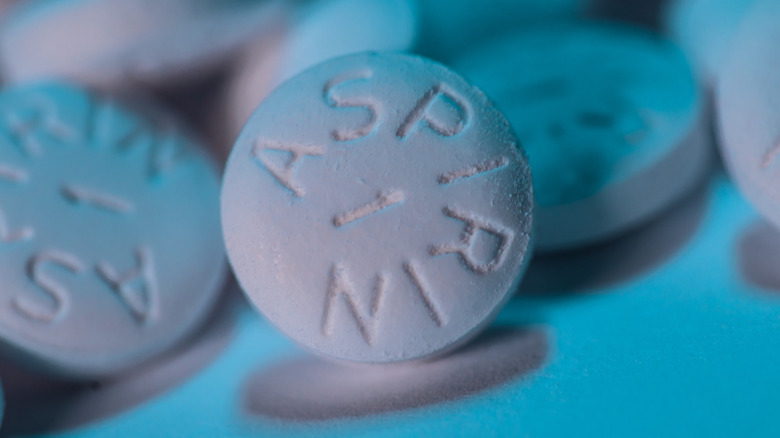Aspirin Vs. Tylenol: Which Is Better For A Fever?
When it comes to over-the-counter (OTC) drugs, two contenders likely come to mind: aspirin and Tylenol. These two products have been around for several decades and have essentially dominated the pain-reliever market. However, these two drugs are not one and the same, and one may be more effective than the other when it comes to addressing specific concerns — in this case, a fever.
Aspirin, which was developed in 1897 in Leverkusen, Germany by German chemist Felix Hoffmann, is identified as a non-steroidal anti-inflammatory drug (NSAID). Hoffman created aspirin by altering salicylic acid to create acetylsalicylic acid, per the Texas Heart Institute Journal (posted at the U.S. National Library of Medicine). Aspirin basically works by blocking certain enzymes in the body that activate when tissue is damaged, thus causing pain, inflammation, and swelling, according to Insider.
Tylenol, on the other hand, was invented in 1955 by American Robert L. McNeil Jr. in Philadelphia. McNeil was working at his grandfather's company, McNeil Laboratories, when he developed Tylenol to compete with aspirin, per The New York Times. The drug, which was originally intended as a children's painkiller, is labeled as acetaminophen (or an analgesic antipyretic). Acetaminophen works by inhibiting our brains from releasing the chemicals that allow us to feel pain (via Healthline). So which is truly the better option when it comes to reducing a fever?
Aspirin uses and efficacy
Aspirin is a common compound sold generically as well as under the brand names Bayer, Ecotrin, and Bufferin. The tablets comes in several dosages, including baby aspirin (75-81 mg), and regular strength (325 mg), according to Live Science. The daily intake approved for aspirin ranges between 50-6,000 mg, depending on the persistence of one's symptoms, however, one should not exceed 12 tablets in a 24 hour period, according to the United Kingdom's National Health Service (NHS). The drug is also approved for use in children ages 3 and up, but only after first consulting a physician.
As a non-steroidal anti-inflammatory drug (NSAID), one of aspirin's predominant uses is to treat inflammation in the body. It can also treat pain caused by toothaches, menstrual cramps, and headaches, per Insider. However, aspirin doesn't just work on run-of-the-mill aches; it can also be taken to prevent blood clots, and to reduce the risk of strokes and heart attacks, via Live Science. That's a lot of uses, but how do NSAIDs fare as far as fevers go?
Aspirin is actually one of the most popular choices for reducing a fever, alongside acetaminophen (Tylenol) and ibuprofen (Advil). It does have some serious limitations, however. Babies or toddlers under three years of age cannot take aspirin. NSAIDs are not recommended for the elderly to consume, as the medication can increase the risk of psychosis and cognitive impairment. Nor are NSAIDs recommended for pregnant women, via VOX.
Tylenol is also effective
Tylenol, a brand name for acetaminophen, is also used to treat fever and other condition such as headaches, menstrual cramps, and toothaches (via RxList). The daily dose of Tylenol for adults is 325 mg to 650 mg every 4 to 6 hours, though one should not exceed 4 grams in 24 hours. Tylenol, unlike aspirin, is also safe for younger toddlers and babies to consume, though in smaller doses. In fact, one study found that acetaminophen appears to be safe for treating fever in babies as young as 3 months old, via VOX. That's a major plus if you're a parent. Additionally, Tylenol has held its own when it comes to being safer for pregnant women to consume (when compared to aspirin and ibuprofen).
Tylenol is not without its own risks, though, as high doses of acetaminophen have been linked to liver damage, via Insider. There are sometimes some pretty serious side effects, including shortness of breath and dizziness, and itching and swelling (particularly of the tongue, face, or throat), per RxList.
In general, however, it appears that acetaminophen wins the fever debate simply because it can be used to treat the condition on a wider variety of people. However, if you are a healthy adult, then either option should work fine for you. Still, you're going to want to check with your doctor beforehand. Bear in mind that neither Tylenol nor aspirin should be taken for a fever that persists for longer than three days.


